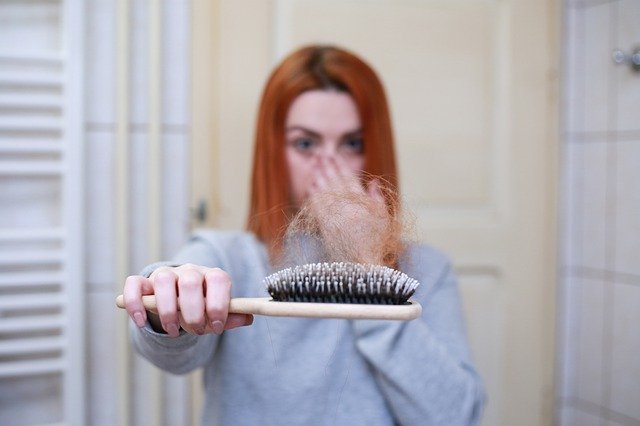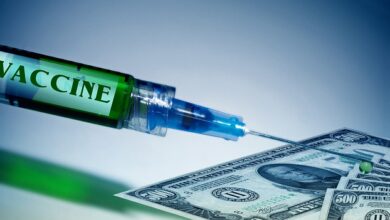Covid-19 Patients New Symptoms: Hair loss

Amid the coronavirus pandemic, a new symptom has emerged: hair loss. As if the more common symptoms of the COVID-19 virus were not severe enough, several patients have reported balding as well.
The first cases of hair loss were reported in late March after the virus had been around for some time. Experts claim that hair loss usually occurs within 3 to 5 months after a person’s body has been subjected to large amounts of stress. After multiple instances of patients reporting this new symptom, the link between COVID-19 and hair loss has finally been established.
Read More »COVID-19 and the Human Body
Following China’s initial outbreak of the virus in 2019, it has spread like wildfire, consuming the lives of thousands worldwide. This disease is fatal because it causes a respiratory tract infection, a condition that greatly impacts your ability to breathe.
Because of this, the lungs are usually targeted first.
The nose is the most optimal entrance for the virus specifically because it contains plenty of gene encoding proteins used by COVID-19 to enter healthy cells. Once the virus has entered your body, it will then use spiked proteins to bind to cellular receptors. Once it does this, it can enter the cell and undergo processes such as mitosis. It can replicate within our bodies and may not be detected until symptoms have already worsened.
Once detected, your immune system will work hard to combat it, however, because the virus is a new strain, your immune system is not properly equipped to combat it. Your immune system’s response may trigger a fever, as most bacteria usually die at high temperatures. Because COVID-19 is immune to this, it begins to develop antibodies that are COVID-19 specific. If this goes well, your body may succeed in fighting the virus.
Your body will continue to create these antibodies long after your body has recovered. This means that if you ever come in contact with the virus again, your immune system will be prepared to fight.
Immune System Failures
At some point, your immune system’s response may be too strong for your body to handle.` This response is called the cytokine storm. Cytokines are effector cells that keep your body at homeostasis. For instance, when a virus enters your body, the effector cells will attempt to raise your body’s temperature to kill it. In a cytokine storm, the body continues to make cytokines at the command of the virus. With a surplus of effector cells, it is difficult to keep the body in balance.
In the case that this occurs, any of your organs can be damaged because immune cells will be flooding to areas that the virus reaches. Some of these cells are potentially fatal in the sense that if they release toxic compounds in order to kill the virus, but are in a place that they should not be, the person may perish. For instance, if these compounds are released near the heart, the heart will malfunction. In this case, it is not the virus, but the person’s immune system that results in death.
Risk Factors and Symptoms
People at risk for the disease generally are elderly, having underlying health problems, or are unhealthy. This includes obese individuals, anyone over age 60, and people with immune or respiratory conditions. Studies have shown that these individuals have a high amount of effector cells in their bodies. Due to this, their immune systems may attack their bodies and result in fatal consequences.
In the United States, approximately 80% of all coronavirus-related deaths have been in elderly individuals, aged 60 and over. A majority of these people reside in nursing homes and because most nursing homes are small, there is not much room for social distancing. If a single senior contracts the virus, there is a high chance that a few others in the home will receive it as well.
The other risk factors can reduce the effectiveness of your immune system. For instance, if you are obese, you are at risk for serious heart conditions such as heart failure. Your risk for such diseases lowers the efficiency of your immune system, making you more susceptible to COVID-19.
Symptoms of the virus usually show up within 2 weeks. A lot of the symptoms are similar to those of the common cold, except they are life-threatening. Symptoms may include fever, chills, coughing, shortness of breath, headaches, muscle aches, sore throats, nausea, diarrhea, and more recently, hair loss.
COVID-19 and Hair Loss
This condition can be caused by a variety of reasons including age, genetics, stress, medications, and hormonal imbalances. Telogen effluvium, a type of hair loss is caused by large amounts of stress and can result in excessive weight loss, high fevers, and balding. This condition has been linked to severe illnesses such as strokes or heart attacks in the past.
We are currently at the 3-5 month timeframe in the pandemic and it makes sense for patients to begin experiencing balding at this time. After the body has experienced large amounts of stress, balding usually occurs nearly 3-5 months later. Because this symptom has recently been discovered, there is not much known as to why some patients may experience hair loss while others do not. Experts think that it may be because of genetics. While the cause is not exactly known, there are treatment options available to combat hair loss.
Treating Hair Loss
Losing your hair can negatively impact your self-image and confidence. With salons currently closed, you might not know what to do about your hair and may avoid a social connection. It is important to note that this condition is not permanent and can usually be reversed in around 4-6 months after.
Speak with your physician if you are concerned about balding. He can prescribe medications such as minoxidil to provoke hair regrowth on your scalp. The key is to be patient. In the meantime, you can use wigs or try natural home remedies such as washing your hair with rice water.





